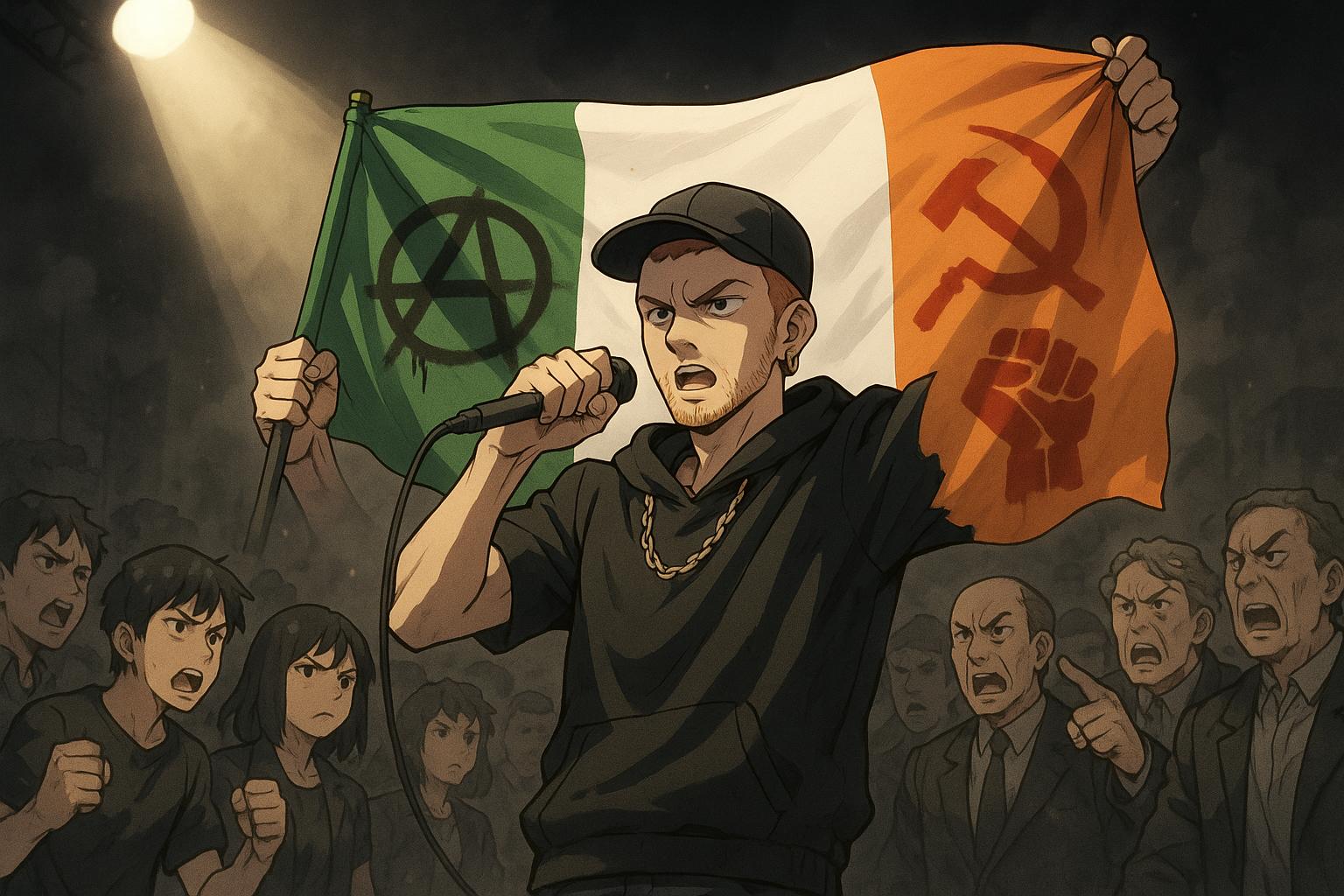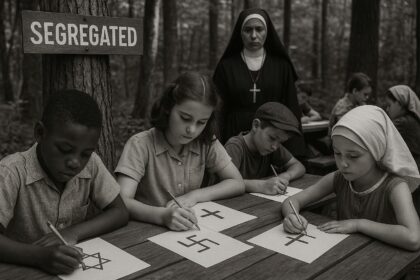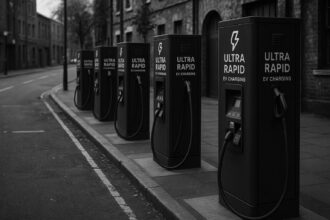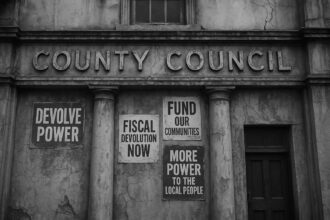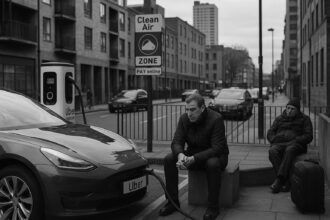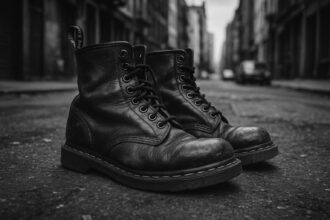The prosecution of Mo Chara, member of Irish rap trio Kneecap, for allegedly displaying a Hezbollah flag during a concert spotlights a growing UK establishment intolerance towards politically charged artistic expression and highlights apparent political hypocrisy in responding to dissent.
The recent legal troubles of Mo Chara, a member of the Irish rap trio Kneecap, have raised significant questions about freedom of expression in the context of a politically charged landscape. Charged under the UK’s Terrorism Act for allegedly displaying a Hezbollah flag during a concert, Mo Chara, whose real name is Liam Óg Ó hAnnaidh, finds himself at the centre of a controversy that intertwines art, politics, and the state. This incident comes amid heightened scrutiny of artists whose works and performances challenge British authority, echoing a long-standing narrative of suppression faced by those expressing dissent.
Kneecap’s supporters view the charges as heavy-handed retribution for the group’s provocative acts, which aim to critique social and political injustices, particularly in relation to the ongoing situation in Gaza. The group vehemently denies any allegations of supporting Hamas or Hezbollah, asserting that their expressive performances reflect a broader condemnation of violence against civilians, regardless of its source. Founded in Belfast, Kneecap incorporates the Irish language into their rap, drawing on a rich tradition of politically motivated art that seeks not just to entertain, but also to provoke thought and incite dialogue about contentious issues.
The timing of Kemi Badenoch’s response to Kneecap is telling. Despite her outspoken condemnation of the band, she seemingly turned a blind eye to accusations against Frank Hester, a high-profile Tory donor, who allegedly made derogatory comments about Diane Abbott, the first Black woman MP in Britain. This apparent hypocrisy from senior politicians accentuates a troubling double standard in the treatment of dissenting voices within the UK. While Badenoch swiftly called for legal action against Kneecap, she delayed in addressing the intolerable remarks allegedly made by Hester, highlighting the selective outrage prevalent in political circles.
The charge against Mo Chara synthesises a broader anxiety amongst the establishment—an unease towards artists and activists who refuse to conform to the status quo. Kneecap’s performances, steeped in defiance, challenge British authority not merely by their content but through the very act of expressing such viewpoints in a public forum. They have, in their artistic pursuits, mocked the duplicity of a government that simultaneously funds their work while targeting them for perceived anti-British sentiments. The group’s clever appropriation of a £14,000 public funding grant, splitting it between a youth centre in the Catholic Falls Road and one in the Protestant Shankill, underscores their commitment to promoting unity amidst division. It is a bold statement that uses the establishment’s resources to foster community rather than discord.
Historically, Irish artists have faced challenges for their outspoken nature, often finding themselves at odds with governmental entities fearing perceived instability. The Irish musical canon, from the protest songs of Christy Moore to the poignant lyrics of bands like The Pogues, reflects this recurring theme of rebellion and resistance. Similar to how Paul McCartney’s “Give Ireland Back to the Irish” was once banned for its provocative message, Kneecap finds itself confronting a similar silencing force within the contemporary landscape.
What is particularly alarming in this case is not simply the arrest of Mo Chara, but the message it conveys to future generations of artists—one that suggests dissent is dangerous, and voices of rebellion must be stifled. The UK establishment’s apparent intolerance for provocative political art seeks to undermine not only Kneecap but every young artist wishing to express their reality.
Ultimately, the prosecution of Mo Chara may not quiet the artistic expression that Kneecap embodies; rather, it shines a spotlight on the very mechanisms of power that attempt to suppress it. This tension reveals a deeper conflict within society, where the voices of those challenging the establishment are increasingly threatened. The louder the drumbeat for silence becomes, the more determined these artists appear to be in making themselves heard. As the discourse surrounding this case evolves, it becomes evident that Kneecap’s struggle is emblematic of a broader fight against the stifling of artistic freedom in the face of political adversity.
Reference Map:
- Paragraph 1 – [1], [2]
- Paragraph 2 – [2], [4], [5]
- Paragraph 3 – [3], [6]
- Paragraph 4 – [1], [4]
- Paragraph 5 – [1], [6]
- Paragraph 6 – [7]
- Paragraph 7 – [1], [2], [5]
Source: Noah Wire Services
- https://www.express.co.uk/news/uk/2060308/kneecap-row-kemi-badenoch – Please view link – unable to able to access data
- https://www.ft.com/content/b88745d2-d29b-4613-8632-fa763eb4f924 – Liam Óg Ó hAnnaidh, known as Mo Chara, a member of the Belfast-based Irish-language rap trio Kneecap, has been charged under the UK’s Terrorism Act 2000 for allegedly displaying a Hezbollah flag during a November 2024 concert in London. The Metropolitan Police’s Counter Terrorism Command initiated the investigation after audience-filmed footage surfaced. Kneecap denies the allegations, viewing the charges as a political distraction aimed at silencing artists critical of global injustices, particularly in Gaza. The group emphasises its condemnation of all attacks on civilians and denies supporting Hamas or Hezbollah.
- https://www.bbc.com/news/uk-northern-ireland-68248799 – The Belfast rap group Kneecap is planning legal action after the UK government blocked a £15,000 grant, citing their 2019 ‘Farewell to the Union’ tour as a source of Conservative anger. UK Business Secretary Kemi Badenoch’s spokesperson stated they did not want to fund groups opposing the United Kingdom. Kneecap’s representatives have instructed Phoenix Law to initiate proceedings, asserting the decision is unlawful and discriminatory.
- https://www.the-independent.com/news/uk/home-news/kneecap-kemi-badenoch-dead-tory-claim-b2740694.html – Conservative leader Kemi Badenoch has called for the prosecution of rap trio Kneecap for allegedly suggesting: ‘The only good Tory is a dead Tory.’ Video from a November 2023 gig shows a member making this statement. Badenoch stated that such ‘anti-British hatred has no place in our society.’ Scotland Yard is investigating the incident, along with another concert where a band member appeared to shout ‘up Hamas, up Hezbollah.’
- https://www.lbc.co.uk/politics/uk-politics/kneecap-kemi-badenoch-iain-dale-hezbollah-hamas-palestine/ – Kemi Badenoch has stated that the Irish rap group Kneecap should face ‘the full force of the law’ after one of its members called for concert attendees to ‘kill Tory MPs.’ The controversial footage, obtained from a November 2024 gig, shows the rapper shouting ‘Up Hamas, up Hezbollah’ during a performance at the O2 in Kentish Town. Scotland Yard’s counter-terrorism division is currently investigating the incident.
- https://www.itv.com/news/utv/2024-11-29/kneecap-wins-legal-case-against-government-over-block-to-funding-award – Irish language rap trio Kneecap has won its legal challenge over a decision by former business secretary Kemi Badenoch to refuse them a £14,250 funding award after the UK Government conceded it was ‘unlawful.’ The group had applied for the Music Export Growth Scheme grant, which was initially approved by the British Phonographic Industry. The government had blocked the funding, stating it did not want to hand out UK taxpayers’ money to those opposed to the United Kingdom.
- https://www.irishtimes.com/culture/music/2025/05/03/kneecap-controversy-what-have-the-west-belfast-rappers-done-now/ – The Conservative leader Kemi Badenoch has called for the group to be banned and a handful of Kneecap gigs have been cancelled; there have also been calls for them to be removed from this year’s Glastonbury. ‘It wasn’t a throwaway remark,’ said Brendan Cox, the husband of murdered MP Jo Cox. ‘It was part of a conversation that they were having about politics, and it was a very clear incitement to violence.’
Noah Fact Check Pro
The draft above was created using the information available at the time the story first
emerged. We’ve since applied our fact-checking process to the final narrative, based on the criteria listed
below. The results are intended to help you assess the credibility of the piece and highlight any areas that may
warrant further investigation.
Freshness check
Score:
8
Notes:
The narrative presents recent events, including the charge against Mo Chara under the UK’s Terrorism Act for allegedly displaying a Hezbollah flag during a November 2024 concert. This charge was reported by the Associated Press on May 21, 2025. ([apnews.com](https://apnews.com/article/951643fa3345a152f86b59bbdcbd0a49?utm_source=openai)) The report also references Kemi Badenoch’s condemnation of the band, which aligns with statements made by her in April 2025. ([lbc.co.uk](https://www.lbc.co.uk/politics/uk-politics/kneecap-kemi-badenoch-iain-dale-hezbollah-hamas-palestine/?utm_source=openai)) The inclusion of these recent developments suggests a high freshness score. However, the narrative’s reliance on a single source and the lack of corroboration from other reputable outlets may indicate potential issues with originality. Additionally, the narrative’s tone and structure, including the use of emotive language and a focus on political implications, may suggest a bias or agenda, warranting further scrutiny.
Quotes check
Score:
7
Notes:
The narrative includes direct quotes attributed to Kemi Badenoch, such as her statement that Kneecap’s “anti-British hatred has no place in our society.” ([standard.co.uk](https://www.standard.co.uk/news/politics/kemi-badenoch-kneecap-prosecution-kill-mp-b1224640.html?utm_source=openai)) These quotes are consistent with her public statements from April 2025. However, the absence of direct quotes from other key figures, such as Mo Chara or representatives from Kneecap, limits the narrative’s comprehensiveness and may indicate a lack of balance. The reliance on a single source for these quotes also raises questions about the narrative’s originality.
Source reliability
Score:
6
Notes:
The narrative originates from the Express, a UK-based tabloid newspaper known for sensationalist reporting. This raises concerns about the reliability and objectivity of the information presented. The lack of corroboration from other reputable sources further diminishes the narrative’s credibility.
Plausability check
Score:
7
Notes:
The events described in the narrative, including the charge against Mo Chara and the political reactions from Kemi Badenoch, are plausible and align with known facts. However, the narrative’s tone, which includes emotive language and a focus on political implications, may suggest a bias or agenda, warranting further scrutiny. The lack of corroboration from other reputable sources also raises questions about the narrative’s authenticity.
Overall assessment
Verdict (FAIL, OPEN, PASS): FAIL
Confidence (LOW, MEDIUM, HIGH): HIGH
Summary:
The narrative presents recent events related to Kneecap’s legal troubles and political controversies. However, its reliance on a single, potentially unreliable source, lack of corroboration from other reputable outlets, and a tone that suggests bias or agenda, raise significant concerns about its credibility and originality. Therefore, the narrative fails to meet the standards of a trustworthy news report.


